★★½
Lady Snowblood
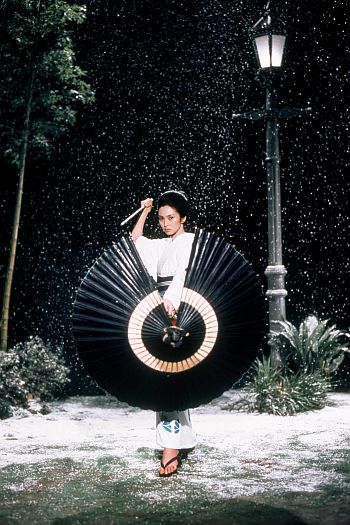 I’ll be honest: I was disappointed. I’d been looking forward to seeing this for a long while, but when we finally cranked it up on Monday, found it pretty dull. Truth be told, Chris was giving it loud Z’s by the end of the film, and I spent a few minutes closing my eyes and just listening to the dialogue. Which, since it was in Japanese, isn’t a good sign either. This was a surprise. A lot of people, whose views I generally respect, really like it, such as mandiapple.com, who called it “nothing short of a masterpiece.” Reading that, I had to check they were reviewing the same film. Because, personally, while its influence on Kill Bill is undeniable, that is a far more effective piece of work.
I’ll be honest: I was disappointed. I’d been looking forward to seeing this for a long while, but when we finally cranked it up on Monday, found it pretty dull. Truth be told, Chris was giving it loud Z’s by the end of the film, and I spent a few minutes closing my eyes and just listening to the dialogue. Which, since it was in Japanese, isn’t a good sign either. This was a surprise. A lot of people, whose views I generally respect, really like it, such as mandiapple.com, who called it “nothing short of a masterpiece.” Reading that, I had to check they were reviewing the same film. Because, personally, while its influence on Kill Bill is undeniable, that is a far more effective piece of work.
The plot in both is needlessly-convoluted, but it has much more of a negative impact here. Here is the story, in chronological order. In late 19th-century Japan, a mother sees her husband and young son slaughtered by a group of four con-artists; she is kidnapped and raped over a period of several days before being abandoned. She vows revenge, but is arrested after killing only one of the four, and sent to prison for life. There, she has a baby daughter, Yuki, spawned for the sole purpose of continuing the revenge. After the mother dies in jail, Yuki is released with another prisoner, and begins her training under a tough Buddhist priest (Nishimura). When she reaches her twentieth birthday, she leaves, to start her mission.
The problems here are multiple, not least that Yuki is just too cold. She might as well be an automaton, as she progresses on her vengeance, showing no emotion or feeling, and it’s hard to feel empathy for her. Yes, she is supposed to be a cold-hearted killing machine, but the performance here is devoid of all humanity. There’s nothing personal here either. Yuki is not the victim; the events in question occurred before she was even conceived, giving her no direct stake in proceedings – she is simply a tool, wielded from beyond the grave by a mother she never really knew. Contrast Kill Bill, where the Bride sees her husband-to-be slaughtered at the altar. As motivation, it’s far superior and resonates much more with the audience.
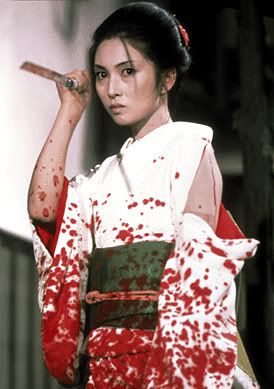 Then there’s the action, which is second-rate at best. It may have seemed cutting-edge when the film was released in 1973. Approaching forty years later… Not so much. There’s little sense that anyone – good or bad – has true sword skills, and the battles are largely brief and perfunctory. Admittedly, the arterial spray is enthusiastic – clearly the high blood-pressure epidemic affecting Japan is not a new phenomena – and looks very pretty on the snow backdrop which is frequently used. However, that can only go some way to overcoming the flaws in the characterization: one suspects the original manga, by Kazuo Koike (who also did Lone Wolf and Cub), perhaps had more room to be better developed in this area. And while we’re at it, what’s with the anachronistic jazz soundtrack, dating from a good half-century after this is set? Any sense of period atmosphere is completely destroyed, every time it cranks up.
Then there’s the action, which is second-rate at best. It may have seemed cutting-edge when the film was released in 1973. Approaching forty years later… Not so much. There’s little sense that anyone – good or bad – has true sword skills, and the battles are largely brief and perfunctory. Admittedly, the arterial spray is enthusiastic – clearly the high blood-pressure epidemic affecting Japan is not a new phenomena – and looks very pretty on the snow backdrop which is frequently used. However, that can only go some way to overcoming the flaws in the characterization: one suspects the original manga, by Kazuo Koike (who also did Lone Wolf and Cub), perhaps had more room to be better developed in this area. And while we’re at it, what’s with the anachronistic jazz soundtrack, dating from a good half-century after this is set? Any sense of period atmosphere is completely destroyed, every time it cranks up.
What works is mostly the visual style, and it’s soundly put together from a technical aspect. Kaji, who plays the adult Yuki, is also solid enough, though was probably better – even if she said less! – in the Female Convict Scorpion series [I must get round to reviewing the excellent Jailhouse 41 here some time, though it won’t be till after we move house in October, and the DVD re-surfaces…]. I also liked the chaste purity here: Yuki doesn’t have any real relationships at all – she lives purely for revenge. However, I feel much the same way about this, that I did about the original Night of the Living Dead. While it certainly deserves to be respected for its influential place in the history of the genre, it feels as if the elements seen here have been revisited with greater success, by those who followed in its foot-steps.
Dir: Toshiya Fujita
Star: Meiko Kaji, Ko Nishimura, Toshio Kurosawa, Masaaki Daimon
★★
Lady Snowblood 2: Love Song of Vengeance
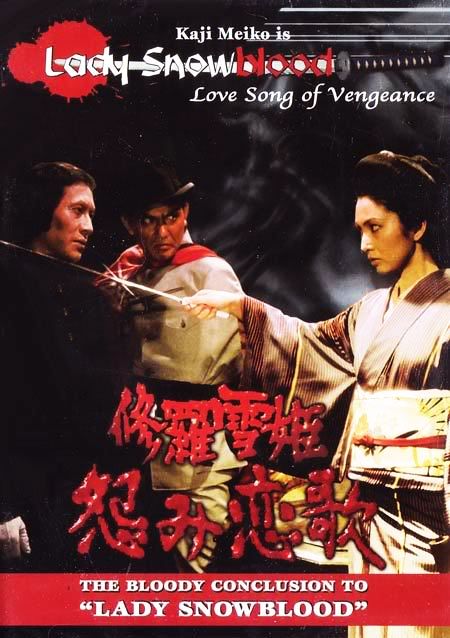 I was hoping that the second film would show me why this series has such a solid reputation, but was even more disappointed by the sequel than the original. There’s a striking opening, where Yuki basically walks out of an ambush, hardly bothering even to pay attention to the men circling her – except to slaughter them. Unfortunately, it’s pretty much downhill from there, with proceedings getting badly bogged down in even more of the political shenanigans that we saw in part one. Yuki is arrested and sentenced to death for her 37(!) murders, but is rescued by the chief of the secret police, Kikui Seishiro (Kishida), who sends her on a mission against nihilist Ransui Tokunaga (Itami), perceived as a threat to the order of things.
I was hoping that the second film would show me why this series has such a solid reputation, but was even more disappointed by the sequel than the original. There’s a striking opening, where Yuki basically walks out of an ambush, hardly bothering even to pay attention to the men circling her – except to slaughter them. Unfortunately, it’s pretty much downhill from there, with proceedings getting badly bogged down in even more of the political shenanigans that we saw in part one. Yuki is arrested and sentenced to death for her 37(!) murders, but is rescued by the chief of the secret police, Kikui Seishiro (Kishida), who sends her on a mission against nihilist Ransui Tokunaga (Itami), perceived as a threat to the order of things.
That’s because Tokanaga and his wife are in possession of a document that could seriously embarrass the government, by proving their involvement in the deaths of Tokunaga’s partners. When Yuki discovers this, she switches sides, though Tokunaga is arrested, tortured and, when he fails to give up the document’s location, injected with bubonic plague [interestingly, this is a decade before the biological weapons work of Unit 731 during WW2 became public knowledge in Japan] and dumped in the slums as a warning to others. Yuki teams up with Tokunaga’s estranged brother, and sets out to take revenge on the government forces responsible for his death.
This is set just after the Russo-Japanese war of 1905, and I’ve a feeling is meant in some way to parallel the political situation of the 1970’s. However, all such sentiment is entirely wasted on Western viewers watching it almost forty years after it was made. If you’re looking at this as an action movie, it plays out in a manner best described as turgid, with very sporadic action, to such an extent that it hardly qualifies as such at all – if it weren’t for the original, I doubt I’d be covering it here. Even the arterial gushiness seems to be less unenthusiastic and sprayful than previously.
On the other hand, Kaji’s portrayal is more emotionally-disengaged this time, and it’s even harder to develop sympathy for a character engaged in some kind of obscure political activism, rather than personal revenge. It’s what perhaps makes this one’s closest cousin V For Vendetta, with samurai swords. And, in case you were wondering, that is not meant to be much of an endorsement. I’d say you are far better off watching the futuristic remake, The Princess Blade or even the better entries in the Crimson Bat series than either of these films, and given my high hopes coming into these, based on their reputation, that’s extremely disappointing.
Dir: Toshiya Fujita
Star: Meiko Kaji, Juzo Itami, Kazuko Yoshiyuki, Shin Kishida
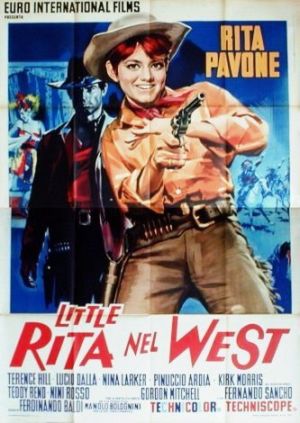 I came into this almost entirely blind, watching it based on the title and the first three minutes off YouTube. You can understand my surprise, after Rita (Pavone) and her German sidekick (Dalla) take out a gang of stagecoach robbers, finishing off by gunning one down in the back, as he lies dazed on the ground, when they… burst into song? Yep, what I didn’t know was, this is actually a musical, designed around the talents of Ms. Pavone, who was apparently a huge pop-star in Italy in the sixties. Hence the songs. Okay, that makes a bit more sense. But it’s still an extremely odd beast, swinging from obvious spoof to apparent seriousness at the drop of a catchy tune.
I came into this almost entirely blind, watching it based on the title and the first three minutes off YouTube. You can understand my surprise, after Rita (Pavone) and her German sidekick (Dalla) take out a gang of stagecoach robbers, finishing off by gunning one down in the back, as he lies dazed on the ground, when they… burst into song? Yep, what I didn’t know was, this is actually a musical, designed around the talents of Ms. Pavone, who was apparently a huge pop-star in Italy in the sixties. Hence the songs. Okay, that makes a bit more sense. But it’s still an extremely odd beast, swinging from obvious spoof to apparent seriousness at the drop of a catchy tune.




 Like most civil wars, the Spanish one was a nasty, brutal affair that split families as well as the nation. Not that you’d know it from this, which suggests the citizens were entirely behind the anarchist forces: odd how the opposing Fascist forces not only prevailed, but then held power for close to 40 years. You don’t do that without significant popular support. Putting that aside (for the moment), this is the story of Maria (Gil), a young nun ‘liberated’ from her convent as the Civil War gets under way, amid a wave of anti-religious fervour. Initially just trying to get home to Zaragosa, she’s escorted by militant militia woman Pilar (Belen), and eventually decides to join their female fighting force and take up arms against the Fascists. That puts them at odds not just with the men in charge, but many of their own sex, who would rather see them doing laundry and providing ancilliary support, rather than in the front lines.
Like most civil wars, the Spanish one was a nasty, brutal affair that split families as well as the nation. Not that you’d know it from this, which suggests the citizens were entirely behind the anarchist forces: odd how the opposing Fascist forces not only prevailed, but then held power for close to 40 years. You don’t do that without significant popular support. Putting that aside (for the moment), this is the story of Maria (Gil), a young nun ‘liberated’ from her convent as the Civil War gets under way, amid a wave of anti-religious fervour. Initially just trying to get home to Zaragosa, she’s escorted by militant militia woman Pilar (Belen), and eventually decides to join their female fighting force and take up arms against the Fascists. That puts them at odds not just with the men in charge, but many of their own sex, who would rather see them doing laundry and providing ancilliary support, rather than in the front lines. Kinda odd to see Dickerson – cinematographer on a lot of Spike Lee’s movies, and Eddie Murphy’s Raw – directing this Lifetime original movie. It’s certainly not edgy, though that’s not what Lifetime is exactly about. You largely know what you’re going to get with their output. Something technically decent, usually with decent enough performances, but something that clings to the viewer’s comfort zone like a limpet. Is it wrong to criticize the channel for that, when it has absolutely no interest in pushing the envelope? It’d be a bit like coming down on Disney for making kids movies. It’s what they do: deal with it.
Kinda odd to see Dickerson – cinematographer on a lot of Spike Lee’s movies, and Eddie Murphy’s Raw – directing this Lifetime original movie. It’s certainly not edgy, though that’s not what Lifetime is exactly about. You largely know what you’re going to get with their output. Something technically decent, usually with decent enough performances, but something that clings to the viewer’s comfort zone like a limpet. Is it wrong to criticize the channel for that, when it has absolutely no interest in pushing the envelope? It’d be a bit like coming down on Disney for making kids movies. It’s what they do: deal with it. Though nominally a Western, this perhaps has more in common with the surreal works of Alejandro Jodorowsky, in particular El Topo, with mystical elements and downright weirdness. Ransom Pride (Scott Speedman, from the Underworld series) is killed in a gun-battle while trying to broker an arms deal with the locals. His corpse is kept by the local bruja, or witch (de Pablo), because her brother also died in the fight, shot by Ransom. That doesn’t sit well with his lover, Juliette (Caplan), a half-breed who has been raised in blood since slitting the throat of the Mexican general who killed her parents, while still not yet a teenager. She returns to Ransom’s home, and recruits his brother (Foster) to help recover the body, on the way back to Mexico, meeting a bevy of strange characters and situations. Their mission doesn’t sit well with the Pride patriarch (Yoakam), a gun-fighter turned preacher, who sets loose a pair of hunters, but is prepared to get his own hands dirty in pursuit of that “whore of Babylon.”
Though nominally a Western, this perhaps has more in common with the surreal works of Alejandro Jodorowsky, in particular El Topo, with mystical elements and downright weirdness. Ransom Pride (Scott Speedman, from the Underworld series) is killed in a gun-battle while trying to broker an arms deal with the locals. His corpse is kept by the local bruja, or witch (de Pablo), because her brother also died in the fight, shot by Ransom. That doesn’t sit well with his lover, Juliette (Caplan), a half-breed who has been raised in blood since slitting the throat of the Mexican general who killed her parents, while still not yet a teenager. She returns to Ransom’s home, and recruits his brother (Foster) to help recover the body, on the way back to Mexico, meeting a bevy of strange characters and situations. Their mission doesn’t sit well with the Pride patriarch (Yoakam), a gun-fighter turned preacher, who sets loose a pair of hunters, but is prepared to get his own hands dirty in pursuit of that “whore of Babylon.” Five mountaineers are exploring the remote Scottish highlands, when they stumble across an underground box containing a terrified, near-dead young girl who speaks no English. Two of the party are sent, by the most direct but not child-friendly route, back to civilization to get help, but it’s not long before they discover the parties who buried the girl are not too happy with her removal. For they are two kidnappers, Mr. Kidd (Harris, who also plays a psychotic killer in The Borgias) and Mr. McRae who are negotiating with her father’s emissary, Darko (Roden) to pay the ransom, not aware that Darko has hired some ex-soldiers to resolve the matter. Having lost the child, the pair set out to recapture her, and don’t care how many bodies are left in their wake.
Five mountaineers are exploring the remote Scottish highlands, when they stumble across an underground box containing a terrified, near-dead young girl who speaks no English. Two of the party are sent, by the most direct but not child-friendly route, back to civilization to get help, but it’s not long before they discover the parties who buried the girl are not too happy with her removal. For they are two kidnappers, Mr. Kidd (Harris, who also plays a psychotic killer in The Borgias) and Mr. McRae who are negotiating with her father’s emissary, Darko (Roden) to pay the ransom, not aware that Darko has hired some ex-soldiers to resolve the matter. Having lost the child, the pair set out to recapture her, and don’t care how many bodies are left in their wake.
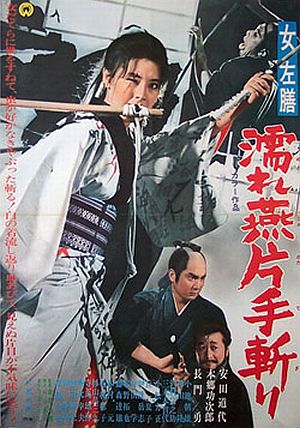 A sequel to One-Eyed One-Armed Swordswoman, this stands more than well enough on its own merits, with an interesting and complex storyline and engaging characters. As a young girl, Lady Sazen (Ohkusu) lost both an arm and her eye to the devilish Lord Daizen-dayu, who coveted the titular sword owned by her father. Sazen barely escaped with it and her life, and is now a wandering swordswoman, roaming the countryside. She saves a girl being chased by some thugs, and it turns out that she knows all the inside dirt on a corrupt priest, and he won’t stop until she has been silenced. Meanwhile, Daizen-dayu hasn’t given up on the sword, and has hired another samurai to get it from Sazen, bu any means necessary.
A sequel to One-Eyed One-Armed Swordswoman, this stands more than well enough on its own merits, with an interesting and complex storyline and engaging characters. As a young girl, Lady Sazen (Ohkusu) lost both an arm and her eye to the devilish Lord Daizen-dayu, who coveted the titular sword owned by her father. Sazen barely escaped with it and her life, and is now a wandering swordswoman, roaming the countryside. She saves a girl being chased by some thugs, and it turns out that she knows all the inside dirt on a corrupt priest, and he won’t stop until she has been silenced. Meanwhile, Daizen-dayu hasn’t given up on the sword, and has hired another samurai to get it from Sazen, bu any means necessary. To be honest, I have very little clue about what was going on here. Oh, the basics are clear enough. After losing their patriarch General Yang Zongbao (Ren) in battle, a noble family opts to send everyone out to the West to defend the realm from the usual invaders. They’re almost entirely female, but all possess significant ass-kicking ability, with their own particular weapon of choice. These are listed, in rapid order, near the start of the movie, and I’d suggest taking copious notes, because you won’t be able to recognize them otherwise: one armour-clad woman looks very much like another when they’re in battle. It’d probably have helped if they’d had a number on the back of their helmets or something. Hey, it’s not like this is a model of historical accuracy to begin with.
To be honest, I have very little clue about what was going on here. Oh, the basics are clear enough. After losing their patriarch General Yang Zongbao (Ren) in battle, a noble family opts to send everyone out to the West to defend the realm from the usual invaders. They’re almost entirely female, but all possess significant ass-kicking ability, with their own particular weapon of choice. These are listed, in rapid order, near the start of the movie, and I’d suggest taking copious notes, because you won’t be able to recognize them otherwise: one armour-clad woman looks very much like another when they’re in battle. It’d probably have helped if they’d had a number on the back of their helmets or something. Hey, it’s not like this is a model of historical accuracy to begin with.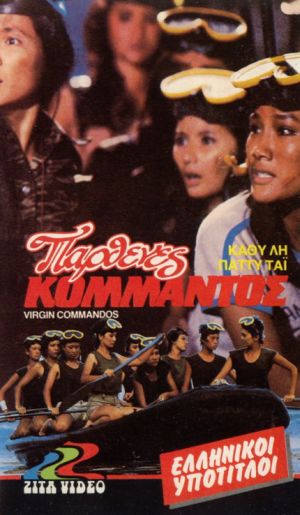 This came out the same year as Golden Queens Commando and Pink Force Commando and feels like a Taiwanese knock-off, taking a similarly bulk approach to its action heroines. They escape from (what I discovered lately was) a North Vietnamese prison, with the help of the warden, who is in love with one of his captives – he comes along too, and they all end up on an island where there’s a guerilla force, run by the Captain, whom we’ll get back to later. They become part of her “Ladies Marine Corps”, and start to train. One of the girls’ mothers shows up, offering to take her back to Hong Kong, but the farewell party is interrupted by pirates, who kill the mother. Two of the platoon desert. Finally – and we’re talking an hour into a movie that runs only 85 minutes – the training is over, and the Slightly-Irritated Frogwomen (movie titler, please note) head off on their first mission, to recover a cache of diamonds hidden on a North Vietnamese boat.
This came out the same year as Golden Queens Commando and Pink Force Commando and feels like a Taiwanese knock-off, taking a similarly bulk approach to its action heroines. They escape from (what I discovered lately was) a North Vietnamese prison, with the help of the warden, who is in love with one of his captives – he comes along too, and they all end up on an island where there’s a guerilla force, run by the Captain, whom we’ll get back to later. They become part of her “Ladies Marine Corps”, and start to train. One of the girls’ mothers shows up, offering to take her back to Hong Kong, but the farewell party is interrupted by pirates, who kill the mother. Two of the platoon desert. Finally – and we’re talking an hour into a movie that runs only 85 minutes – the training is over, and the Slightly-Irritated Frogwomen (movie titler, please note) head off on their first mission, to recover a cache of diamonds hidden on a North Vietnamese boat. I’ll be honest: I was disappointed. I’d been looking forward to seeing this for a long while, but when we finally cranked it up on Monday, found it pretty dull. Truth be told, Chris was giving it loud Z’s by the end of the film, and I spent a few minutes closing my eyes and just listening to the dialogue. Which, since it was in Japanese, isn’t a good sign either. This was a surprise. A lot of people, whose views I generally respect, really like it, such as
I’ll be honest: I was disappointed. I’d been looking forward to seeing this for a long while, but when we finally cranked it up on Monday, found it pretty dull. Truth be told, Chris was giving it loud Z’s by the end of the film, and I spent a few minutes closing my eyes and just listening to the dialogue. Which, since it was in Japanese, isn’t a good sign either. This was a surprise. A lot of people, whose views I generally respect, really like it, such as  Then there’s the action, which is second-rate at best. It may have seemed cutting-edge when the film was released in 1973. Approaching forty years later… Not so much. There’s little sense that anyone – good or bad – has true sword skills, and the battles are largely brief and perfunctory. Admittedly, the arterial spray is enthusiastic – clearly the high blood-pressure epidemic affecting Japan is not a new phenomena – and looks very pretty on the snow backdrop which is frequently used. However, that can only go some way to overcoming the flaws in the characterization: one suspects the original manga, by Kazuo Koike (who also did Lone Wolf and Cub), perhaps had more room to be better developed in this area. And while we’re at it, what’s with the anachronistic jazz soundtrack, dating from a good half-century after this is set? Any sense of period atmosphere is completely destroyed, every time it cranks up.
Then there’s the action, which is second-rate at best. It may have seemed cutting-edge when the film was released in 1973. Approaching forty years later… Not so much. There’s little sense that anyone – good or bad – has true sword skills, and the battles are largely brief and perfunctory. Admittedly, the arterial spray is enthusiastic – clearly the high blood-pressure epidemic affecting Japan is not a new phenomena – and looks very pretty on the snow backdrop which is frequently used. However, that can only go some way to overcoming the flaws in the characterization: one suspects the original manga, by Kazuo Koike (who also did Lone Wolf and Cub), perhaps had more room to be better developed in this area. And while we’re at it, what’s with the anachronistic jazz soundtrack, dating from a good half-century after this is set? Any sense of period atmosphere is completely destroyed, every time it cranks up. I was hoping that the second film would show me why this series has such a solid reputation, but was even more disappointed by the sequel than the original. There’s a striking opening, where Yuki basically walks out of an ambush, hardly bothering even to pay attention to the men circling her – except to slaughter them. Unfortunately, it’s pretty much downhill from there, with proceedings getting badly bogged down in even more of the political shenanigans that we saw in part one. Yuki is arrested and sentenced to death for her 37(!) murders, but is rescued by the chief of the secret police, Kikui Seishiro (Kishida), who sends her on a mission against nihilist Ransui Tokunaga (Itami), perceived as a threat to the order of things.
I was hoping that the second film would show me why this series has such a solid reputation, but was even more disappointed by the sequel than the original. There’s a striking opening, where Yuki basically walks out of an ambush, hardly bothering even to pay attention to the men circling her – except to slaughter them. Unfortunately, it’s pretty much downhill from there, with proceedings getting badly bogged down in even more of the political shenanigans that we saw in part one. Yuki is arrested and sentenced to death for her 37(!) murders, but is rescued by the chief of the secret police, Kikui Seishiro (Kishida), who sends her on a mission against nihilist Ransui Tokunaga (Itami), perceived as a threat to the order of things.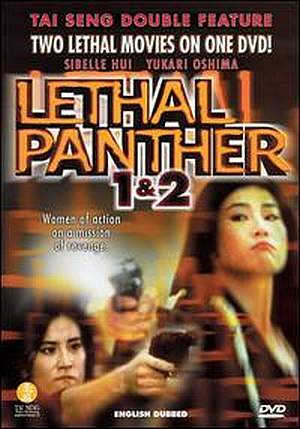 While there’s no denying the
While there’s no denying the